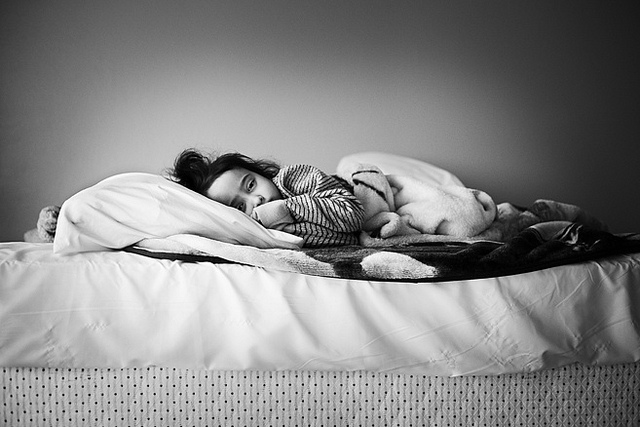I remember exactly where I was when I decided to not ever feel again.
The bed in the orphanage dormitory was all white. It creaked when I moved. On either side of me lay other little girls creaking in their white beds. The walls were white too, but in the dark I couldn’t see them.
My hands and feet were cold. My stomach hurt. I was terrified.
“Don’t feel,” I said to myself. “You can do it. You can stop everything from hurting, just don’t feel.”
Of course, I was only three years old, so I didn’t actually have the language to say all those things. But, of course, I was able to communicate with myself and provide myself with a survival strategy. I was able—in my inchoate state—to figure out that if I felt anything at all about why my mother left me (or when she would come back), it wouldn’t feel good.
Ten years later, I was standing over the crib on the day my mother brought my baby brother home from the hospital, where he had almost died from spinal meningitis.
“We’re supposed to keep an eye on him,” she’d said. “In case he gets sick again.”
I leaned down and pulled a corner of the blanket over my brother’s small, sleeping body. At the same time, I pulled a corner of something made out of steel over my aching heart.
I didn’t want to keep an eye on my brother to see if he got sick again. It hurt too much.
“Don’t feel.”
I’ve had chronic, low-level—and sometimes not so low-level—depression all my life.
Big surprise that a woman who decided not to feel anything would be depressed.
Most mornings, I awaken with the thought that instead of having another day in which to be grateful to be alive, I have yet another day to get through.
That is, until I got married again four years ago, and I was entirely surprised by something.
“What’s that symphony you’re playing?” I asked David one morning. “What’s it called? Who wrote it?”
Whenever he’s home, David plays classical music. He’s listened to it all his life, knows all the composers, the names of all the pieces, and has developed a deep love for all that such works of art have to offer.
He told me early on, “When you listen to classical music, listen to it with your body—not with your head.”
And so, it happened.
How does the composer know what I’m feeling? How can he tell my story? How can he speak so well of my innate love of life—the love that I myself had suppressed?
As it turns out, Tchaikovsky awakened me. He went to the side of my bed in the orphanage, with his music, and said, “Don’t freeze—awaken. Awaken to all that there is.”
Of course, he did it wordlessly—just the way I’d done it when I was a little girl.
He did it with his music.
So, set aside 20 minutes, click on the video below, and put earbuds in your ears. Close your eyes and let the opening bars of the music bring you back to an early scene—any early scene will do.
As the music progresses, allow yourself to feel its vibrations in your body. Sit with the physical feelings the music stirs in you, without questioning them or naming them, until the entire piece is played out. When the music culminates, allow the applause of the audience to wash over you.
~
Author: Carmelene Siani
Image: Flickr/Monica H.
Editor: Yoli Ramazzina


 Share on bsky
Share on bsky





Read 2 comments and reply